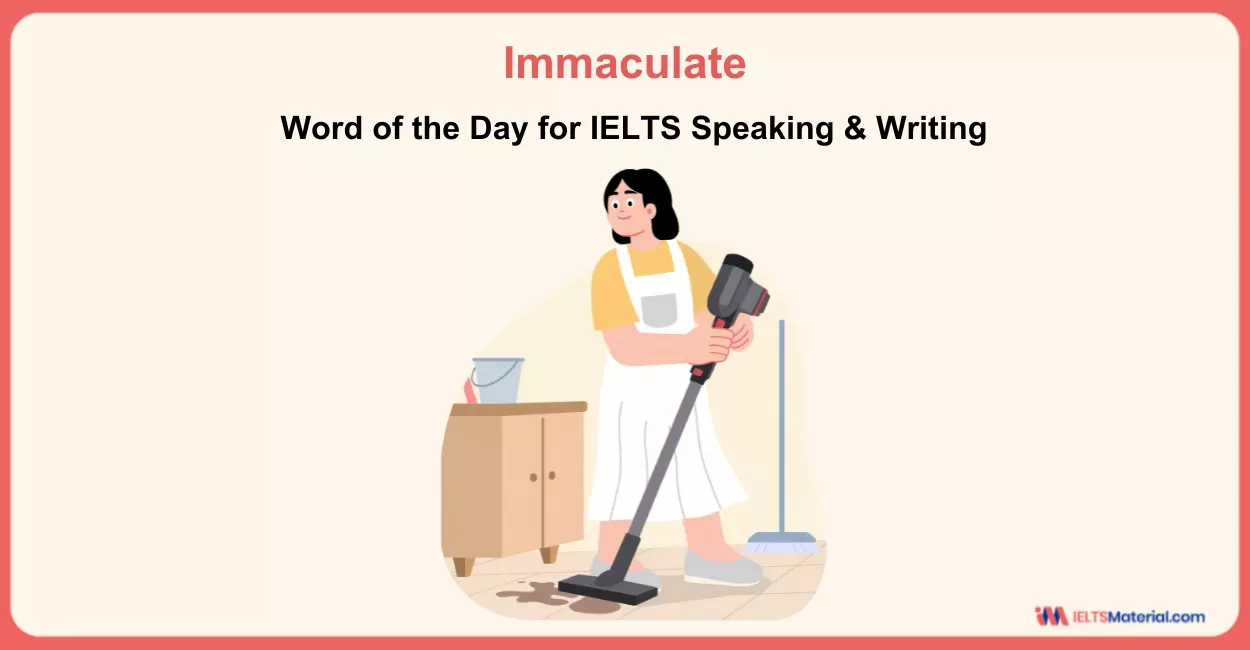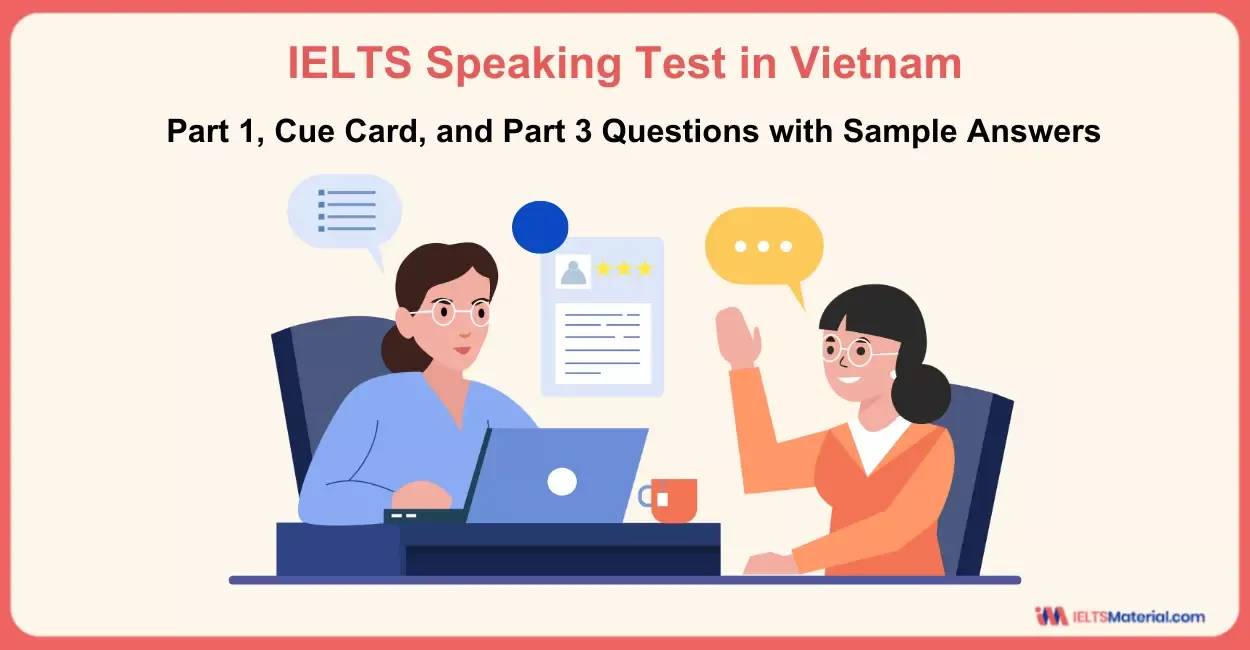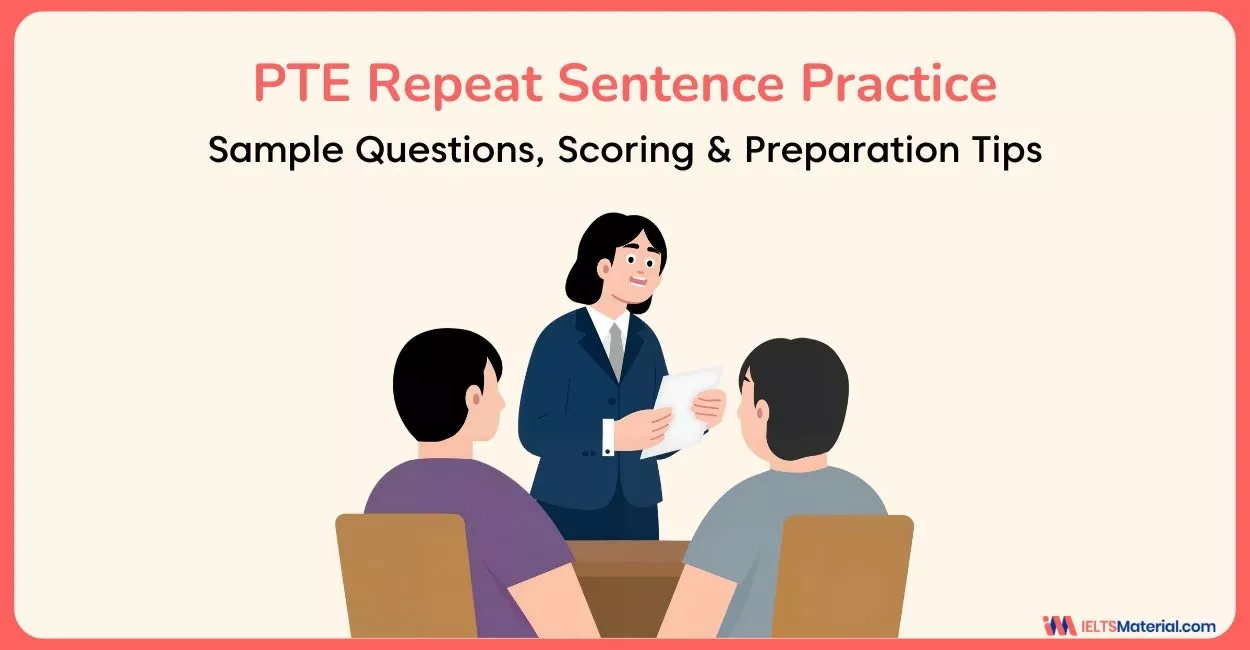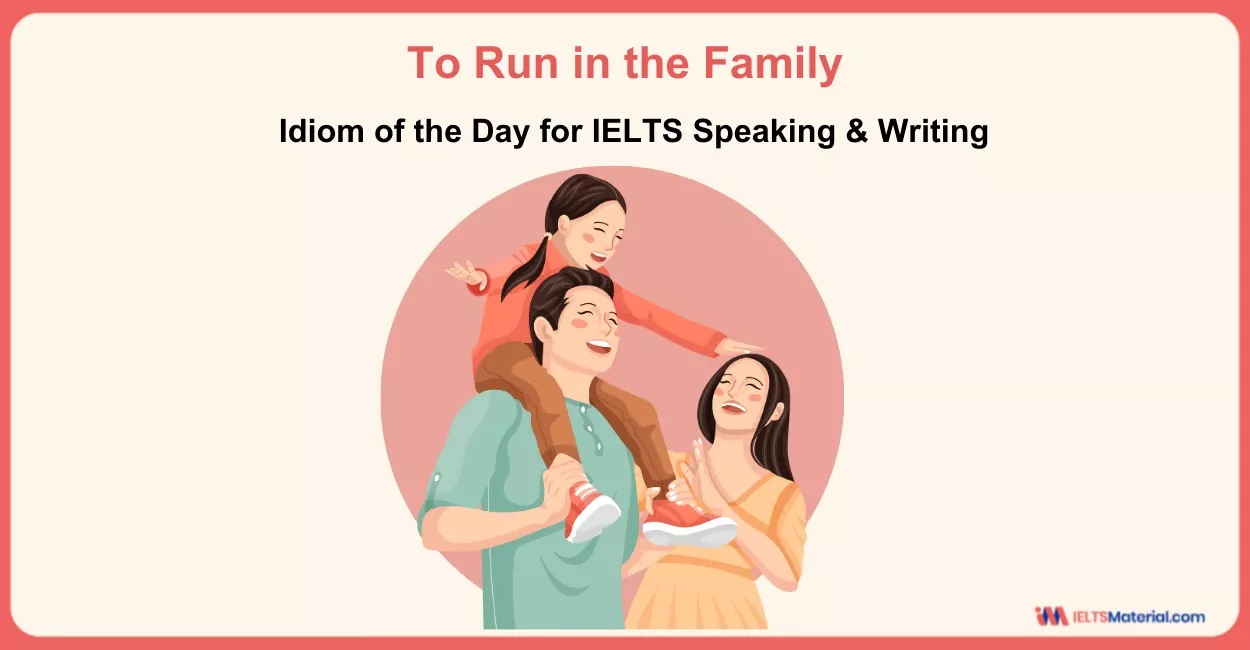IELTS Speaking Test in Vietnam – Part 1, Cue Card, and Part 3 Questions with Band 9 Sample Answers
Unlock the strategies to prepare for the IELTS Speaking Test in Vietnam with Part 1, Cue Card, and Part 3 questions and build confidence, boost vocabulary, as well as improve fluency with Band 9 sample answers.
Table of Contents

Limited-Time Offer : Access a FREE 10-Day IELTS Study Plan!
The IELTS Speaking Test in Vietnam holds much more as an assessment than a simple conversation. It is a structured assessment which will measure your ability to communicate fluently while showcasing great lexical flexibility. Not only will you understand what to expect in each past such as Part 1, cue card, and Part 3, but you will also delve into strategies, vocabulary, and topics to boost your confidence. By analyzing the sample answers, you will hone your speaking skills and showcase a higher language proficiency level in the IELTS Exam.
Connect with our band 9 IELTS Trainers to crack your IELTS Speaking in no time! Book a FREE Demo.
How to Practice Using the Band 9 Sample Answer of IELTS Speaking Test in Vietnam?
To score a higher IELTS Band Score, it is important to know how to use the mock questions as you prepare for the IELTS Speaking Test in Vietnam. By incorporating effective speaking preparation techniques, you will be able to use these sample answers to your advantage. Let’s look at the tips below which can guide you on how to practice using such materials.
- Always try to break down the answer by IELTS Criteria such as Fluency and Coherence, Lexical Resources for range and accuracy of vocabulary, Grammatical Range and Accuracy for sentence structures, and Pronunciation.
- Do not just read the answer and focus on the individual structure to be used for each part of the IELTS Speaking section.
- The sample answers are not for memorizing the answers rather use them to compare it with yourself. It is suggested that you try answering the questions by recording yourself speaking after which listen back to it for noting these down.
- Focus on your intonation and voice modulation so that you can work on them as you practice. Practice shadowing to understand how to put stress on particular words and showcase emotions.
- Note down the topic-specific IELTS Vocabulary words so that you can incorporate these into your preparation.
- Use a score checklist and evaluate your answers critically. In this way, you will be able to understand your progress level and also note down the areas of improvement.
- It is important to focus on one criterion at a time to avoid getting overwhelmed. This will also help in focusing on one particular area and work towards improving it.
- Always make sure to check the IELTS Grammar topics and look at your sentence structures.
Want to learn Useful Idioms for IELTS Speaking? Check out the video below!
Part 1 Questions for the IELTS Speaking Test in Vietnam
The IELTS Speaking Part 1 is mostly considered the "warm-up" stage where you will be asked very general questions. This part is the examiner's first impression of your flow of speech, correctness, and confidence. Even though the questions here seem easy, you need to prepare well to avoid giving either too shortly or repetitively or memorizing responses. Below are the part 1 questions for the IELTS Speaking Test in Vietnam on three distinct topics such as hometown, job, and outdoor activities.
-
Hometown
1 Where did you live when you were a child?
I was raised in a close-knit family. As a child, I lived in a joint family with my grandparents in Haryana’s small village. It was an old-fashioned house with a big garden where my cousins and I spent a lot of time playing football.
2 How long have you lived there?
I had lived there for around eight years before my family left for Delhi. It’s been more than eight years since I left my hometown. Undeniably, my childhood days in the village in my grandparents’ house were some of the most beautiful days of my life.
3 Why did you move to another place?
Earlier then, My dad had decided to set up his business in a city, and he wanted me and my sister to pursue further education. As there were no good opportunities for setting up a business and no higher education in the village, we moved into Delhi.
-
Job
1 What was your dream job when you were a child?
When I was a child, I dreamt of being an astronaut to see the stars and the moon closely. But only when I grew older, I began to realize that the dream of being an astronaut was never going to become a reality as it requires a lot of perseverance. Unfortunately, now I’ve to be more realistic and focus on my current job as a News Editor.
2 What do you like about your job?
Actually, I’m enjoying my job as a News Editor. I love a little bit of everything, the planning, the research, the proofreading, correcting the content, the cyclical nature of the job, and my co-workers.
3 What are your responsibilities at work?
As an editor, my responsibilities include preparing language, images, ensuring that the style and tone of a piece are consistent, and approving the final text that goes as a headline in a newspaper, a website, and a magazine.
-
Outdoor Activities
1 Do you often do exercise?
Well, I’m not a fitness enthusiast, but I try to stay fit by doing some sort of exercise twice or thrice a week. I don’t get to go to the gym due to my heft work schedule, but I make sure to spare some of my time to perform yoga and meditation.
2 What kinds of exercise do you like?
Some physical exercises such as squats, push-ups, press-ups, pilates, and yoga are activities that I usually do in the morning and the evening. Although these exercises are pretty exhausting, it helps me increase my strength and boost my energy, balance, flexibility, and endurance. Therefore, I am fit as a fiddle.
3 What are the popular activities at school?
Many popular activities are conducted at school for the student’s overall development depending upon the infrastructure available. Many outdoor sports activities like football, hockey, volleyball, and cricket and indoor games like chess & carrom are played in school, helping develop various skills.
4 Is it good for students to do regular exercise?
Of course! Students must be encouraged to exercise regularly, helping them be physically fit and mentally healthy. They should spare at least 30 minutes from their busy schedule to work out or do some weight lifting or any physical activity which will help them stay fit and toned.
Prepare yourself with the Comprehensive IELTS Speaking Band 8 Preparation Course and ace the IELTS Speaking Test in Vietnam.
Part 2 Cue Card Questions for the IELTS Speaking Test in Vietnam
The IELTS Speaking Part 2 tests your fluency and organization of ideas within a limited time frame. You are expected to talk about a given topic for one to two minutes, with preparation time lasting only one minute. This is your chance to show how well you are able to express advanced vocabulary, organize coherent structures, and relate personal experiences. Remember to put down your notes during the preparation time and record yourself speaking so that you can compare yours with the band 9 sample answers provided. Let’s look at the cue card below!
Describe A City/Place You Want To Live In The Future
You should say
- Where is it?
- What is it famous for?
- And explain why you like to live there?
Sample Answer for Part 2 Cue Card Questions for the IELTS Speaking Test in Vietnam
With every passing year, just like the changing ambitions , the places in my “must visit” list also keep changing. But it’s NewYork City that has managed to be there for a long time. I don’t know whether it is the effect of watching constant web-series or the result of constant scrolling through pinterest , but it is the place I want to visit and live in the future.
I won’t be talking much about what I will be doing for a living, but I will choose to be more descriptive about my imaginations. Out there on the streets, I want to roam freely. The buildings are astonishingly tall and eye-catching. It encompasses the most distinctive architecture I have ever imagined. The city is never asleep. The skyline buildings are lined up so high as if they are competing with each other in a quest to touch the soft blue sky. It looks beautiful when the dark night is just about to break.
As I will make my way down the city street, I think I will feel overwhelmed by people walking and talking in different languages. People with looks that I have never seen before; people who look bizarre to me. Everyone is different in their own way. I think the people are in a rat race as it is a highly competitive world out there. I want to visit Central park and also the dock which is inside the park. I want to spend my weekend in Times Square. Thus, the beauty of the city attracts me more than any other city I have ever imagined living in. If not, I will visit that place once in my lifetime for sure.
Vocabulary for Part 2 Cue Card Questions for the IELTS Speaking Test in Vietnam
- Astonishingly: amazing
Eg: Her necklace is astonishing - Bizarre: not so ordinary
Eg: His behaviour was bizarre - Quest to touch: desire to
Eg: Her quest to touch the stethoscope is the reason for her run after her dream career. - Encompass: surround and have or hold within.
Eg: Our semester encompasses six months.
Level up your preparation for the IELTS Speaking test with the Vocabulary for IELTS (Essential words for popular topics in IELTS).
Part 3 Follow-Up Questions for the IELTS Speaking Test in Vietnam
The IELTS Speaking Part 3 includes analytical questions that require discussion of opinions, comparing of ideas, and analyzing trends. This segment will put forth questions relating to the topic given in the cue card but not related to your answer. Let's look at the part 3 discussion questions to prepare you for IELTS Speaking in Vietnam.
1 What are the main disadvantages of living in a city?
The first thing that pops into my head is the high level of pollution that people have to suffer from, varying from air pollution to noise pollution. In addition to that, due to the large number of people living in cities, it’s more challenging to find a job because there are so many people searching for job vacancies at the same time.
2 How do you think cities could be improved?
In my opinion, the policymakers must help reduce the number of vehicles commuting on the streets, which will definitely reduce the level of pollution. Moreover, creating more green space is also an option to take into consideration when we want to improve the living quality of city dwellers. I would say that the government is not just individuals who play the most important role in such efforts.
3 Are people less friendly in cities than in the countryside?
I think it’s rather harsh to say that people from the cities are less friendly than those who come from the countryside. It mainly depends on the personalities of each person. Or maybe a lot of people have that negative thought because people from the cities are busier with their work, and they don’t have enough time to worry about other people’s issues.
4 Why do a lot of people want to move to a foreign country?
There are many reasons people move to a foreign country, and it differs from person to person. But one of the primary reasons people migrate to a foreign country is in search of better employment opportunities. They choose to move in to pursue their career pursuits and be successful in their life.
5 What factors in a new place affect people’s lives?
One of the significant factors that will affect people’s lives when they move to another place in the environment because it influences people’s behaviour and moods. And it takes a lot of time for people to adapt and become familiar with the environment.
6 Why do people move to other cities to live?
Although there are several reasons people relocate, the main reason is the lack of job opportunities. People decide to switch career paths. They move to other cities where they may get high earnings, better prospects, and better quality of life.
Vocabulary for Part 3 Follow-Up Questions for the IELTS Speaking Test in Vietnam
- Differ: to be not like something else; to be different
Eg: His opinions differ from his father’s. - Migrate: to travel to a new place or country, usually in order to find work and live there temporarily.
Eg: John migrated to the USA to complete his education. - Influence: the capacity to affect the character, development, or behavior of someone or something, or the product itself
Eg: Smartphones have great influence on children. - Relocate: to move or move something or someone from one place to another
Eg: He decided to relocate to the UK for his studies. - Switch career: a change to a different type of job from the one you have been doing
Eg: After working as a Content Writer, John switched careers. - Prospects: the possibility that something good might happen in the future
Eg: An enormous amount of paddy harvest is in prospect.
Enroll into our Free IELTS Webinar and learn more about techniques to improve your speaking answers.
Strengthen your thought process and speaking style with the IELTS Speaking Test in Vietnam as you look at the Part 1 and Part 2 Cue Card and Part 3 sample answers. Practice the IELTS Speaking section consistently to make your structure logical and coherent, and sound fluent. In this way, you will be able to achieve a band 9 while expressing ideas with no grammatical errors.
Also Check:
- 10 Useful IELTS Speaking Tips to Impress the Examiner
- Linking Words for IELTS Speaking Section
- IELTS Speaking Recent Actual Tests with Suggested Answers for IELTS 2025
- 50 IELTS Speaking Part 3 Topics; Questions with Answers
- 75+ Common English Words Used in IELTS Speaking Test
- IELTS Pronunciation Guide 2025
Explore IELTS Speaking

Start Preparing for IELTS: Get Your 10-Day Study Plan Today!
Explore other IELTS Articles

Kasturika Samanta

Haniya Yashfeen
Recent Articles
Haniya Yashfeen

Kasturika Samanta

Kasturika Samanta







Post your Comments